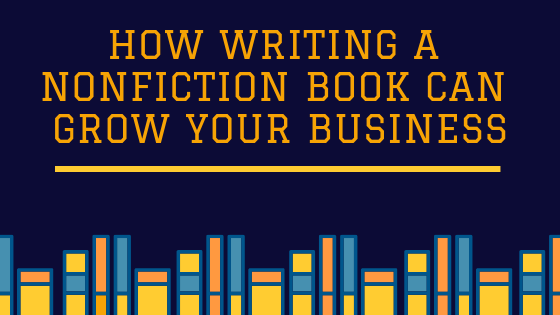
The title of “author” carries with it considerable clout and respect in both social circles and in the business community. While it is a relatively simple process to publish a book in this day and age, there is still a certain skill and dedication level required to pen a manuscript, even if you are an expert in the subject matter.
Books demonstrate mastery of a topic. The reason this is true is because readers interpret the written word differently than nearly any other medium. Once something is in writing and printed on a page, it is generally accepted as factual, true or both. This lends authors credibility, especially if the subject matter they have chosen dovetails with their field of expertise elsewhere. If an accountant writes a book about accounting, his or her career will strengthen the reputation of the book, and the book will help advance his or her career.
Even though being an author is a positive thing, some remain skeptical about just how effective a non-fiction book can be in promoting an author’s overall business. Can books be equally powerful for any kind of business? Do they have to fit a particular style or have a particular tone? What if the book doesn’t sell? Can a book hurt your business and professional reputation? These are all excellent questions, and each should be explored fully before risking considerable time and effort.
Nevertheless, it is clear from repeated examples that positioned properly and written with an eye towards enhancing your professional image, a non-fiction book can be an extraordinary asset. Here are some things to consider.
Storytelling is Job One
Veteran business leaders will tell you success in nearly any field boils down to storytelling. It is the form in which nearly any kind of information can be conveyed without fatigue, distraction or anxiety on the part of your audience, even if that audience only consists of a single person. Every big deal in business starts out as a story and ends up as a story. People who know how to tell those stories recognize the universal truth about human beings. Stories invite people to lower their defenses and take an active interest.
The best non-fiction books are not page after page of statistics, charts and graphs. They are stories involving compelling characters, unique challenges, drama, conflict and ultimate resolution. Teaching someone about accounting can be a really boring slog through math, ledgers, credits and debits, or it can be the story of the journey of man from the middle ages through the renaissance, victory in the age of explorers and finally the advent of the corporation, worldwide trade and the modern age. Which sounds more interesting? A good storyteller will make certain his or her readers are engaged if they choose the latter, and show an audience why accounting is so powerful and so necessary.
Your Story is Your Business
At least one of the stories you will tell in your non-fiction writing is your own story. The reason this is so powerful is because it is how and where you make an emotional connection with your audience. This is vitally important. It is so vital, in fact, that if you ignore every other piece of advice you get about writing your non-fiction book, this advice should still guide you.
People respond to stories and they respond to other people. A non-fiction book is one of the very few mediums where you can combine the two into a powerful message. Writers can do things that other artists cannot, no matter how hard they try. Writers can do fifteen chapters on what someone is thinking and still hold a reader’s interest. Authors learn over time that their stories are personal things that are best conveyed from one person to another.
This is the key to making an emotional connection with a reader and in the process making an impression that will never be forgotten. People forget facts and figures all the time. People forget where they put their keys. They forget names, birthdays and passwords. But once someone makes a true emotional connection with them, that is something they never forget.
Building a business relationship on that emotional connection is how some of the wealthiest and most influential people in the world make their mark.
Your Story is Your Product
A fair number of best-selling business non-fiction books include the author’s business plan. Printed on the pages are the secrets to how that author built their business and found a way to deliver value to their customers and clients. This is one of the most popular and successful formats for a non-fiction book, because it creates a product, a service and an educational resource for the reader all at the same time.
When a new entrepreneur wants to learn how to build their own business, one of their first and best options is to turn to the printed page to find out how others who have gone before them got the job done. If that book happens to have been written by an entrepreneur who has a product or service to sell that is related to the subject matter in their book, not only are they likely to find a reader and a fan, they might even find a new customer as well.
This opens up an enormous universe of possible book subjects, even for authors without any particular success in any particular field outside their “day” job. The value of the knowledge is what governs the overall value of the book. If there is a success story to be had, that is just icing on the cake.
Your Book is the Key
Finally and most importantly, your book is the key to getting your message into places where only authors can go. Suppose you would really like your local newspaper to do a feature story on you? What’s going to be more interesting to the editor and the paper’s readers? Local businessman wants to talk about himself, or local author’s new business book debuts in bookstores everywhere next week? The book is newsworthy. It is what gets you screen time and column inches. From there, the message is up to you.
Suppose you want to appear at an event at your local mall? You can schedule a book signing. Want to visit a convention? Set up a table with free signed copies and shake hands with your readers. Charity event? Donate copies of your book to a local library. Authors get speaking engagements and opportunities to do events at schools. Authors get interviewed and asked for advice. Every one of those introductions, conversations, signed books and public events is another opportunity for you to meet potential clients, network with other businesspeople, learn about your market and get your name and reputation out into the marketplace where it can be discovered by the people you want in your business.
Sales
Once the initial release tour has completed, the next phase in maximizing the value of your new book is to get as many sales as possible. Book sales are among the most valuable kinds of sales you can get in any industry, because every sold book is paid proof your work is worth reading. There is enough reading material on the web to keep anyone busy for 100 lifetimes, but if they instead choose to pay to read your book, that is social and professional proof that can’t be matched in any other way.
It is for this reason you should avail yourself of all the advice you can about how to best position your book, how to market it and how to get as many sales as you can. If you can reach a best seller list, that is even better, since that is something you can use to market your next book and every title after it.
Be aware of the fact marketing non-fiction books is somewhat different from marketing fiction. Everything from cover design to layout to presentation, blurb and which retailers you choose can be different depending on the subject matter and your ideal audience.
Good storytellers are quite rare. One need only consider the fact that most books don’t sell at all, and of those that do, only a tiny percentage make enough to support their authors. For business leaders, however, good storytelling and book sales mean a lot more than just another source of income. A successful book can convey your unique message and grow your business in ways nothing else can.
